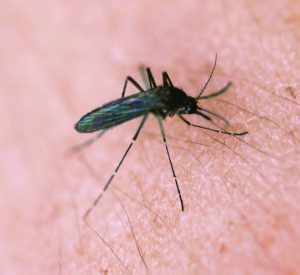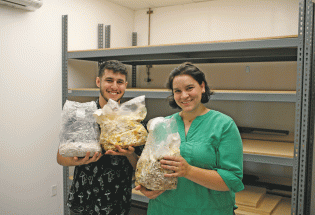Berthoud mosquitoes test positive for West Nile Virus
By Amber McIver-Traywick
The Surveyor
West Nile Virus (WNV) has been detected in Berthoud for the first time in 2018. Both the City of Fort Collins and the Town of Berthoud found Culex mosquitos in traps that tested positive for the virus.
The most recent data for Berthoud shows one trap tested positive for the presence of WNV and traps in town and further out have what is considered high or extremely high numbers of female Culex mosquitos which carry the disease. 
The Town of Berthoud established a policy for mosquito control and spraying in June of 2017. The resolution states that through a mosquito surveillance program traps are weekly tested to monitor the effectiveness of its ongoing larvicide program to curb the number of adult mosquitos. When the numbers of adult mosquitos that do test positive for WNV reaches a Vector Index (VI), a number calculated by combining the number of Culex mosquitoes with the number that are infected with WNV, of .5 or higher, “…adult mosquito control measures for adult insects will become a priority issue for the Town of Berthoud.” The measure also ensures the community will be given a 48-hour notice prior to spraying operations taking place. The VI for Berthoud is currently at .27.
WNV is a serious and sometimes fatal disease spread by the Culex mosquito. Signs of illness usually appear between three to 14 days after a person is bitten by an infected mosquito. One in five people infected will develop a fever along with other symptoms like headache, body aches, joint pains, vomiting, diarrhea or rash. Less than one percent of those infected develop serious neurological illness such as encephalitis or meningitis, which is inflammation of the brain or surrounding tissue.
In 2017 there were 69 reported cases of WNV in Colorado, including four deaths. Fourteen of those cases were reported in Larimer County and 14 were reported in Weld County.
Thousands of people in Colorado were infected with West Nile virus when it first appeared in the state in 2003, the worst year in Larimer County. Sixty-three people died. Many people who became seriously ill are continuing to recover, while others suffered permanent disabilities.
In Colorado, other important mosquito-borne diseases include western equine encephalitis, Saint Louis encephalitis, and heartworm in dogs.
To help reduce the risk of contracting the disease the Centers for Disease Control (CDC) recommends avoiding being outside during dawn and dusk when the mosquitos are active, but if you must be out during these times to wear long loose-fitting clothing and apply insect repellant. The CDC also suggests installing or repairing screens on windows and doors or use air conditioning. You can help reduce the numbers of mosquitos around your home by emptying any standing water where mosquitos lay their eggs, from areas like flowerpots, gutters, buckets, pool covers, pet water dishes, discarded tires, birdbaths and any other containers on a regular basis.
- December, 26 2019

EPA: northern Front Range has “...
By Amber McIver-Traywick The Surveyor The U.S. Environmental Protection Agency (EPA) announced on Tuesday that...
- March, 08 2018

Engagement Announcement
Tiffany Sieu of Denver, Colo., and...
- April, 16 2015

Trustees engage in strategic planning
By Rudy Hemmann The Surveyor The town trustees gave up a large portion of their...
- July, 14 2022

News Bites – July 14, 2022
Two Berthoud businesses near the intersection of Highway 56 and U.S. Highway 287 have experienced...
- December, 03 2022

Larimer County looking for ‘con...
Prime agricultural land at the foot of the Rocky Mountains for sale. It could be...
- August, 03 2023

Ambrosia Harvest starts sprouting mus...
Photo by Will CorneliusIsaiah Chavez and Sara Del Cuore with their...

POLICEBLOTTER
Community News
Northern Water sets C-BT quota at 70% for 2024
Community News

Emotions run high during Revere Property hearing
Community News
Snowpack at 119% above normal
Community News

Karspeck to serve third term as Berthoud mayor
Community News

OPINION – No bitchin’ allowed
Community News
Roy Tripi to become principal of BHS on July 1
Community News
COMMUNITY CALENDAR:
Community Calendar – add an event
Homestead Fine Art Gallery First Fridays OPEN HOUSE
03 May 4:00 PM - 7:00 PM
Homestead Fine Art Gallery First Fridays OPEN HOUSE
07 Jun 4:00 PM - 7:00 PM
Homestead Fine Art Gallery First Fridays OPEN HOUSE
05 Jul 4:00 PM - 7:00 PM
Homestead Fine Art Gallery First Fridays OPEN HOUSE
02 Aug 4:00 PM - 7:00 PM
Homestead Fine Art Gallery First Fridays OPEN HOUSE
06 Sep 4:00 PM - 7:00 PM
Homestead Fine Art Gallery First Fridays OPEN HOUSE
04 Oct 4:00 PM - 7:00 PM

